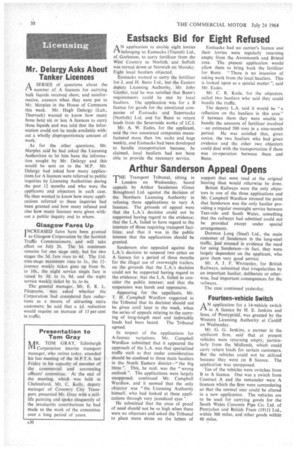Arthur Sanderso n Appeal Opens
Page 32

If you've noticed an error in this article please click here to report it so we can fix it.
THE Transport Tribunal, sitting in London on Wednesday. heard appeals by Arthur Sanderson (Great Broughton) Ltd. against the decision of the Northern Licensing Authority in refusing three applications to vary A licences. The grounds of appeal were that the L.A.'s decision could not be supported having regard to the evidence; that the L.A. failed to have regard to the interests of those requiring transport facilities; and that it was in the public interest that the applications should be granted.
Sanderson also appealed against the L.A.'s decision to suspend two artics on A licence for a period of three months for the illegal use of overweight trailers, on the grounds that the L.A.'s decision could not be supported having regard to the evidence: that the L.A. failed to consider the public interest; and that the suspension was harsh and oppressive.
Appearing for the appellants, Mr. T. H. Campbell Wardlaw suggested to the Tribunal that its decision should not be given until later in the week, when the series of appeals relating to the carrying of long-length steel and indivisible loads had been heard. The Tribunal agreed.
In respect of the applications for A-licence variations. Mr. Campbell Wardlaw submitted that it appeared the approach of the L.A. was that specialized traffic such as that under consideration should be confined to three main hauliers in the North Eastern district—" the big three ". This, he said, was the "wrong outlook ". The applications were largely unopposed, continued Mr. Campbell Wardlaw, and it seemed that the only objector was "the Licensing Authority himself, who had looked at these applications through very jaundiced eyes ".
He submitted that the onus of proof of need should not be so high when there were no objectors and asked the Tribunal to place more stress on the letters of support that were read at the original hearing than would otherwise be done.
British Railways were the only objectors in one of the three applications and Mr. Campbell Wardlaw stressed the point that Sanderson was the only haulier providing a regular overnight service between Tees-side and South Wales, something that the railways had admitted could not be provided except under special arrangements.
Dorman Long (Steel) Ltd., the main customer of Sanderson in the long-steel traffic, bad stressed in evidence the need for using Sanderson—in fact, they were largely dependent on the applicant, who gave them very good service.
Mr. A. J. F. Wrottesley, for British Railways, submitted that irregularities by an important haulier, deliberate or otherwise, had important consequences for the railways.
The case continued yesterday.
Fourteen-vehicle Switch
AN application for a 14-vehicle switch to A licence by H. E. Jenkins and Sons, of Pontypridd, was granted by the Western Licensing Authority at Cardiff on Wednesday.
Mr. G. G. Jenkins, a partner in the applicant firm, said that at present vehicles were returning empty, particularly from the Midlands, which could carry return loads for certain customers. But the vehicles could not be utilized because they were on B licence. The application was unopposed.
Ten of the vehicles were switches from B to A licence. One was a switch from Contract A and the remainder were A licences which the firm were surrendering so that the normal user could be altered in a new application. The vehicles are to be used for carrying goods for the South Wales Concrete Pipe Co. Ltd. of Pontyclun and British Fram (1911) Ltd., within 300 miles, and other goods within 40 miles.
















































































































